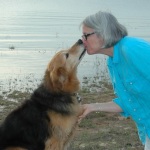Grief is universal, but it feels intensely lonely and personal, and if you are not an animal lover, read no further. This is not about ethical wills or hospice cards, although that might come later.
While we all have read the incredible stories of dogs and what they are capable of, this is not to tell you mine — it is to help me get through my first day without him, a day I have never wanted to see, a day that I cognitively understand is normal but to which my gut screams No!
 Yesterday, I had to put to sleep my first dog, my dearest companion, a golden retriever/collie mix named Jackson who just appeared on our doorstep one June 12 years ago. He was about 1-1.5 years old, had been abused and abandoned, and had been seen running around for several days in our neighborhood in a rural part of Maryland. Skinny, matted, he would not go to anyone. He wound up on our doorstep early one morning, whining, and when the door was opened, up he looked with a sweet, tentative look, and a thumping tail, with “please? I need somebody…” radiating from his entire body.
Yesterday, I had to put to sleep my first dog, my dearest companion, a golden retriever/collie mix named Jackson who just appeared on our doorstep one June 12 years ago. He was about 1-1.5 years old, had been abused and abandoned, and had been seen running around for several days in our neighborhood in a rural part of Maryland. Skinny, matted, he would not go to anyone. He wound up on our doorstep early one morning, whining, and when the door was opened, up he looked with a sweet, tentative look, and a thumping tail, with “please? I need somebody…” radiating from his entire body.
He’s a rescue dog, and I’m the one he rescued. I mis-read his body language: what he was really saying was, “please? you know you need me…” He was, of course, absolutely right. It just took me a few years to realize it.
This post is to give an answer to the first of my two questions below.
First question: How do you get up, this first morning without your best friend, and face this day?
First answer: We were given bladders for just this reason.
 Second question, parts A & B: And DO you still go for that morning walk, and if so, HOW do you go for a walk — without him?
Second question, parts A & B: And DO you still go for that morning walk, and if so, HOW do you go for a walk — without him?
Second answer — Part A: yes, of course, why do you think you were given a dog in the first place and not a cat? Partly, to get you outside. Part B: see the previous post.
So I hope you read that post, and I hope it gets to someone else who needs to know it, too.





